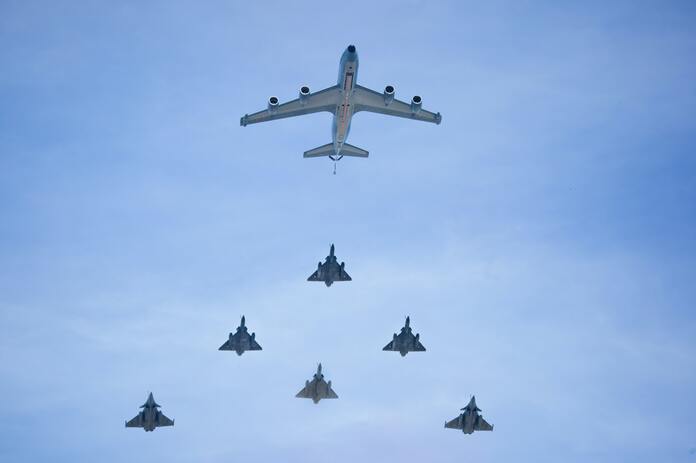Boeing (NYSE:BA) recently received a contract to modify missile systems and associated spares. The award was presented by the Naval Air Systems Command at Patuxent River, Maryland.
Deal Specifications
The $1.17 billion contract is planned to be finished in March 2029. Boeing will supply 400 RGM-84L-4 Harpoon Block II Update (HIIU) Grade B canister tactical missiles, four RTM-84L-4 Block II HIIU Grade B canister exercise missiles, 411 containers, four explosion test vehicles, and two Harpoon Weapon System Joint Common Test Sets (JCTS) under the conditions of the agreement.
Harpoon Coastal Defense System (HCDS) spares, weapon station support equipment, JCTS spares, and missile spares will also be delivered by the aviation giant. In addition, it will provide HCDS training equipment, integrated logistical support, technical publications, field service agents, and training.
A significant percentage of this transaction’s work will be completed in McKinney, TX, and Pontiac, MI.
The Deal’s Advantages
Increasing geopolitical tensions throughout the world have spurred nations to beef up their defense systems. With rapid technical advancements, missile defense has become increasingly important in a nation’s defense policy. With the United States being the world’s largest weapon supplier and Boeing being a major US missile manufacturer, rising missile defense adoption by nations offers the corporation with substantial growth potential.
Boeing’s Defense, Space & Security segment, in particular, is involved in the research, development, manufacture, and modification of goods and related services, such as strategic missile and defense systems. Its Harpoon missile is the world’s most successful anti-ship missile and is used by more than 30 countries’ armed forces.
Harpoon missiles have been updated over the years, and the Harpoon Block II is now available. Boeing’s product portfolio also includes the supersonic Bomarc missile, the Thor missile, the AGM-86B/C Air Launched Cruise Missile, and the GAM-77 Hound Dog Missile.
Boeing is in high demand in the defense industry because of its superior armament. The most recent contract is a prime illustration of this, which should increase its top-line growth.
Prospects for Growth
To bolster their defense capabilities, nations have boosted their defense spending on military equipment and diverse arsenals. Rising geopolitical tensions and increased terrorist threats are driving the growth in demand for defense equipment. As a result, demand for military missiles, which are an essential component of any defense system, has been steadily increasing.
According to Mordor Intelligence, the market for missiles and missile defense systems is expected to grow at a CAGR of 4.9% between 2022 and 2027. Such brisk growth trends point to several expansion potentials for Boeing, which has a valuable position in the missile sector.
Northrop Grumman (NYSE:NOC), Raytheon Technologies (NYSE:RTX), and Lockheed Martin (NYSE:LMT) are a few defense primes that can gain from the aforementioned market.
Northrop Grumman develops and manufactures missile components such as advanced high-speed propulsion systems, fuses, warheads, and controllers for air, sea, and land-based weapons.
The company’s long-term earnings growth rate is 3.5%. The Consensus Estimate for NOC’s 2023 revenue is up 4.6% from the reported amount for 2022.
Missiles & Defense at Raytheon is a major designer, developer, integrator, manufacturer, and sustainer of integrated air and missile defense systems. The unit is a prime contractor or a key subcontractor on a number of missile and related programs for the United States Department of Defense.
Raytheon’s long-term earnings growth rate is estimated to be 8.3%. The Consensus Estimate for RTX sales in 2023 is 7.8% more than the prior-year reported amount.
Missiles and Fire Control (MFC) at Lockheed Martin is a well-known designer, development, and producer of precision engagement aerospace and defense systems for the United States and its allies. For military customers, MFC designs manufacture, and supports modern combat, missile, rocket, manned, and unmanned systems. The United States Army, Navy, Air Force, Marine Corps, NASA, and scores of international allies are among them.
LMT’s long-term earnings growth rate is estimated to be 6.9%. Lockheed Martin stock has risen 4.4% in the last year.
Featured Image: Unsplash









